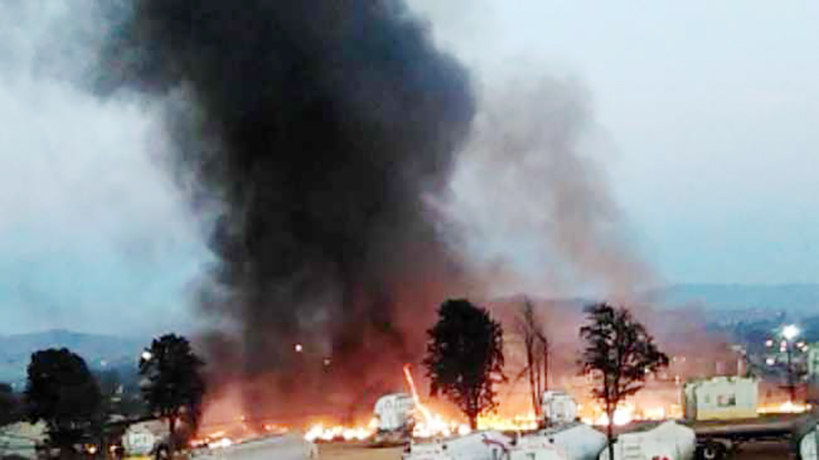click to dowload our latest edition
CLICK HERE TO SUBSCRIBE TO OUR NEWSLETTER


Published
3 years agoon
By
Nicola MiltzThe smattering of Jewish residents living in troubled Eswatini breathed a sigh of relief this week at the brief calm in the mountain kingdom following days of violent unrest by pro-democracy protesters and police.
“It was very tense last week, but things have calmed for now,” said local resident Frances Aron, who lives in Mbabane.
She is one of between 30 to 50 Jewish residents who live in the tiny nation of 1.1 million people.
The landlocked and impoverished kingdom of Eswatini, formerly known as Swaziland, was rocked last week by brutal clashes between security forces and demonstrators calling for democratic reform. King Mswati III has ruled the country for 35 years.
Demonstrators barricaded roads and looted and set fire to businesses owned or linked to the royal family, while videos posted on social media before an internet blackout alleged that security forces had viciously assaulted demonstrators. There have been many deaths, some say at least 60, and countless severe injuries from beatings and shootings, the numbers of which are still unconfirmed at this stage.
The protest has been simmering for some time, but moved up a notch in May after the alleged killing by police of law student Thabani Nkomonye, which angered students and teachers.
Protests escalated late last month, as youths took to the streets demanding democratic reform in the tiny country where the king leads a lavish lifestyle amidst rising poverty.
Daily Maverick this week released graphic images and video footage of murder and torture allegedly at the hands of the Royal Swazi Police Service and the Umbutfo Eswatini Defence Force, showing a kingdom in which human rights and media freedom don’t exist.
There have been allegations of torture and abduction of pro-democracy activists and journalists.
“The pandemic and unemployment have exacerbated suffering,” said Aron. “People are tired of living on Coca-Cola and mielie meal, and want to be seen and heard.”
Aron, who lives alone, said she was relieved this week when things calmed down enough for her to leave home to get supplies including gas and food.
It was unnerving not to have internet access. “I couldn’t contact anyone, there was no Facebook or WhatsApp, and there were a few days of uncertainty and worry, but things seem okay now and I have been able to stock up,” she said.
A Jewish Mbabane resident who didn’t want to be identified because of the volatility, described the situation as a “temporary recess”.
“It’s calmer. We’re waiting to see what happens,” she said, pointing out that “there are very few Jews in the country, and they are all keeping a low profile like everyone else, especially during the unrest”.
“Things aren’t back to normal because nothing has been resolved. There is an army and police presence and a no-nonsense curfew from 18:00 until 05:00. Businesses close at 15:30, the internet is still very limited and slow, and schools are closed. But there is a sense that we must just relax and keep things calm. People are at home, no one is provoking or protesting for the moment while we wait.”
There is no “Jewish life” in Eswatini, in which a community comes together to celebrate simchas and chagim. The majority are expatriates including Israeli aid workers.
Israeli humanitarian aid agency IsraAID earlier this year dispatched a medical team to Eswatini to support the country’s vaccination rollout. It’s understood that some workers continued their operations from South Africa while the protests were in full swing last week.
Regional ministers were sent to Eswatini over the weekend to try to defuse the crisis, but left without properly engaging the opposition.
According to reports, opposition leaders said the government had handpicked only a few less-critical civil society leaders to meet the three ministers of the Southern African Development Community (SADC) on Sunday. A number of civil society groups accused the Eswatini government of excluding those who are calling for multiparty democracy in Africa’s last absolute monarchy.
Members of several Eswatini civil society groups then gate-crashed the meeting, demanding to be included in talks.
Eswatini’s acting prime minister, Themba Masuku; Foreign Minister Thuli Dladla; Justice Minister Pholile Dlamini Shakantu; and a few church and civil society leaders met South Africa’s minister of international relations, Naledi Pandor; Botswana International Affairs Minister Dr Lemogang Kwape; and Zimbabwe Foreign Affairs Minister Frederick Shava, representing SADC’s security troika tasked with addressing regional security threats.
It was agreed that the SADC ministers would go home and return at a later date to meet the opposition delegation. A date for this next meeting hasn’t yet been set. SADC ministers will try to facilitate an “open national dialogue”.
Aron told the SA Jewish Report that it would take time for things to resolve. “We don’t know what will happen tomorrow. The protests could erupt again. It’s sad. People want a Constitution and fair representation. Time will tell how this plays out.”
The anonymous resident said, “For now, the shops are open, there’s food, limited internet, and we have power. Unless you are on the streets after curfew, there’s no fear, and the government has told people to go back to work.
“Things are fragile, we aren’t back to where we were. We’re waiting for dialogue, so I guess you could say that we’re in limbo, but there are good winds blowing. I’m hopeful.”
